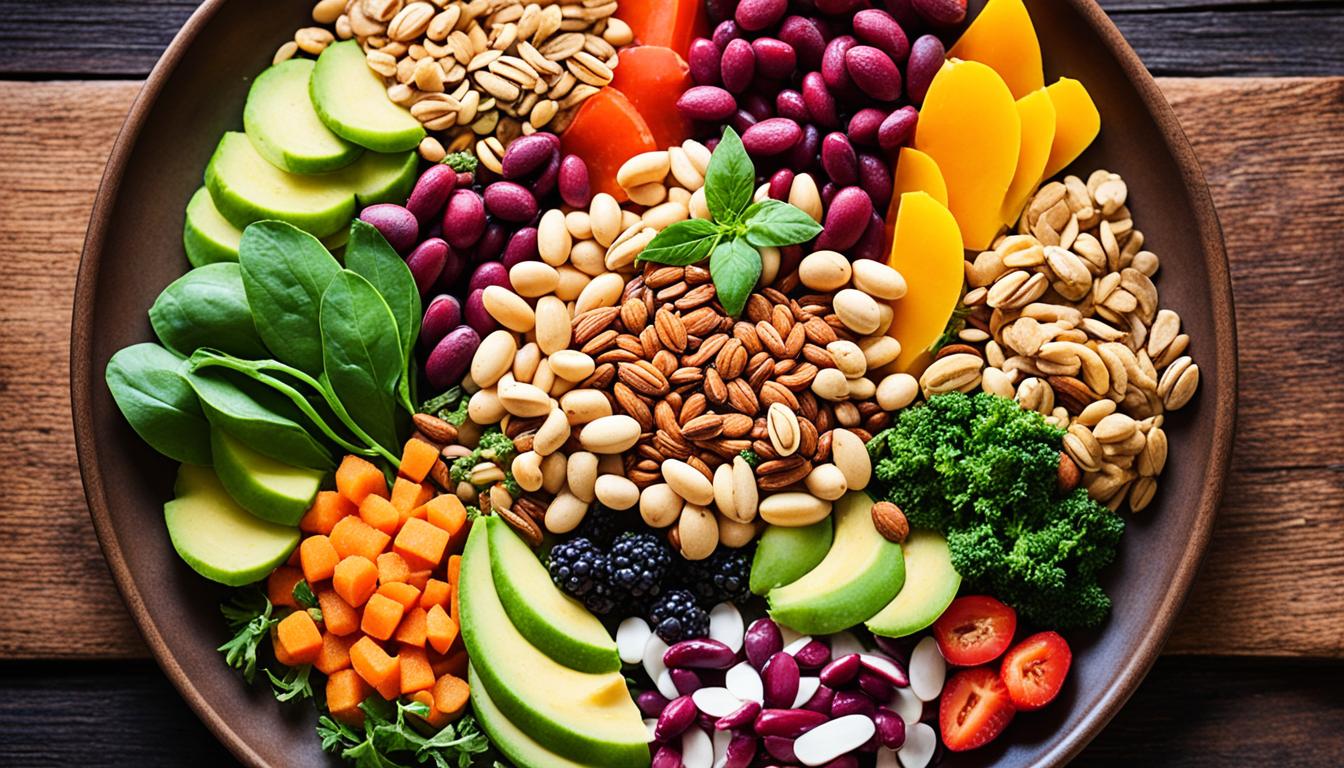Welcome to the first section of our article series on improving digestion and gut health. In this section, we will explore effective strategies and lifestyle changes that can have a positive impact on your overall wellbeing. With these practical tips, you can optimize your digestion and enhance your gut health for a healthier and happier you.
To kick things off, let’s dive into the importance of incorporating a fiber-rich diet into your daily routine.
One of the key ways to improve digestion and promote gut health is by including plenty of fiber in your diet. Foods such as fruits, vegetables, whole grains, and legumes are excellent sources of dietary fiber.
Fiber acts as a prebiotic, nourishing the beneficial gut bacteria and promoting their growth. It also helps regulate bowel movements and prevents constipation by adding bulk to the stool.
By incorporating a fiber-rich diet, you can support healthy digestion and optimize your gut health.
Now that you have an overview of the first section, let’s jump in and discover how a fiber-rich diet can benefit your digestive system and overall health.
Incorporate a Fiber-Rich Diet
One of the key ways to improve digestion and gut health is by incorporating a fiber-rich diet. Foods such as fruits, vegetables, whole grains, and legumes are excellent sources of dietary fiber. Fiber helps regulate bowel movements and promotes healthy digestion by adding bulk to the stool and preventing constipation.
Fiber also acts as a prebiotic, nourishing the beneficial gut bacteria and promoting their growth. When consumed, fiber reaches the large intestine undigested, where it provides fuel for the gut microbiota. This helps maintain a diverse and balanced gut microbial population, essential for optimal gut health.
For best results, aim to include a variety of fiber-rich foods in your diet. This includes fruits like apples, berries, and pears, vegetables such as broccoli and Brussels sprouts, whole grains like oats and quinoa, and legumes like beans and lentils. Eating a mix of soluble and insoluble fiber can provide a range of benefits for your digestion and overall well-being.
Stay Hydrated
Hydration plays a crucial role in maintaining optimal digestion and gut health. Drinking an adequate amount of water throughout the day helps soften the stool, making it easier to pass. It also helps break down food and aids in nutrient absorption. Dehydration can lead to constipation and hinder the natural digestive process. Aim to drink at least 8 glasses of water daily to support a healthy digestive system.
Staying hydrated is essential for a well-functioning digestive system. Water acts as a lubricant, allowing food to move smoothly through the digestive tract. It helps prevent constipation by softening the stool and promoting regular bowel movements.
Additionally, adequate hydration supports the breakdown and absorption of nutrients. Water helps dissolve and transport nutrients from the digestive system to the bloodstream, ensuring that your body can efficiently utilize these essential components for overall health and well-being.
Dehydration, on the other hand, can lead to various digestive issues. When the body is lacking in fluids, it tries to conserve water by reabsorbing it from the colon, resulting in harder and drier stools. This can cause discomfort and difficulty in passing stool, leading to constipation.
By prioritizing hydration and making sure to drink enough water each day, you can support a healthy digestive system and optimize gut health. Remember to listen to your body’s hydration needs and adjust your fluid intake accordingly, especially during hot weather or physical activity. Choose water as your primary source of hydration and limit your intake of sugary beverages, as they can have adverse effects on digestion.
Manage Stress Levels
Chronic stress can have a detrimental impact on digestion and gut health. When we’re stressed, our body’s fight-or-flight response is activated, diverting resources away from digestion. This can lead to symptoms such as indigestion, bloating, and diarrhea. Implement stress management techniques such as deep breathing exercises, meditation, or engaging in hobbies to reduce stress levels. Prioritizing self-care and finding healthy coping mechanisms can greatly support digestive health.
Stress management plays a crucial role in maintaining a healthy gut. Chronic stress can disrupt the balance of gut bacteria, potentially resulting in digestive issues. By incorporating stress reduction techniques into your daily routine, you can support a healthy gut and enhance overall digestion.
Deep breathing exercises are a simple yet effective way to reduce stress levels. By taking slow, deep breaths and focusing on your breath, you activate the relaxation response and lower stress hormones. Incorporate deep breathing exercises into your daily routine or during stressful situations to promote relaxation and support healthy digestion.
Another powerful stress management tool is meditation. Research has shown that regular meditation practice can reduce stress levels, improve digestion, and enhance overall gut health. Find a quiet and comfortable space, close your eyes, and focus on your breath or a soothing mantra. Just a few minutes of daily meditation can have profound effects on your stress levels and digestive system.
In addition to deep breathing exercises and meditation, engaging in hobbies and activities that bring you joy and relaxation can also help manage stress levels. Whether it’s practicing yoga, painting, gardening, or playing a musical instrument, finding activities that you enjoy can provide a much-needed break from daily stressors and contribute to better digestive health.
Remember, stress management is a key component of maintaining a healthy gut. By implementing stress reduction techniques and prioritizing self-care, you can support optimal digestion and enhance your overall gut health.
Regular Exercise
Regular exercise is not only beneficial for our cardiovascular and muscular health, but it also plays a significant role in supporting digestion and gut health. Engaging in physical activity stimulates intestinal contractions, which helps food move through the digestive tract more efficiently. This can prevent issues such as bloating and constipation, promoting a healthier gut.
To reap the benefits, aim for at least 30 minutes of moderate-intensity exercise most days of the week. Activities like brisk walking, cycling, or swimming are great options to incorporate into your routine. Remember, consistency is key to maintaining a healthy gut.
Exercise and Digestive Health
The digestive system thrives when supported by regular physical activity. Exercise improves blood flow, which in turn enhances the delivery of oxygen and nutrients to the digestive organs. It also helps regulate metabolism and can aid in weight management, which is crucial for optimal gut health. So, lace up your sneakers and get moving to improve your digestion and overall well-being.
Maintain a Healthy Weight
Maintaining a healthy weight is crucial for optimal digestion and gut health. Excess weight, particularly around the midsection, can exert pressure on the stomach and intestines, leading to acid reflux and other digestive disorders. It’s important to prioritize weight management to reduce the risk of gastrointestinal issues and promote better digestion.
Achieving a healthy weight involves adopting a balanced diet and engaging in regular exercise. By consuming nutrient-rich foods in appropriate portions, you provide your body with the necessary fuel for efficient digestion. Include a variety of fruits, vegetables, whole grains, lean proteins, and healthy fats in your daily meals.
Regular physical activity is another essential component of maintaining a healthy weight and supporting digestion. Exercise helps stimulate intestinal contractions, facilitating the movement of food through the digestive tract. It can also alleviate symptoms of bloating and constipation.
Remember, achieving a healthy weight is not about restrictive diets or excessive exercise. It’s about embracing a sustainable and balanced approach to nutrition and physical activity. Consult with a healthcare professional or a registered dietitian to develop a personalized plan tailored to your specific needs and goals.
Get Sufficient Sleep
Sleep plays a vital role in maintaining optimal digestion and gut health. When we sleep, our body goes into a state of rest and repair. During this time, the digestive system works to process the food we have consumed throughout the day and absorb essential nutrients. Lack of sleep can disrupt this natural rhythm and affect the release of digestive enzymes, leading to digestive disturbances such as indigestion, bloating, and constipation.
Aim for 7-9 hours of quality sleep each night to support optimal digestion and gut health. Establishing a regular sleep schedule, where you go to bed and wake up at the same time every day, can help regulate your body’s internal clock. Creating a peaceful sleep environment by eliminating distractions, such as electronic devices and excessive noise, can also contribute to better digestive function.
Remember, sleep is not just a luxury but a necessity for your overall well-being. Prioritize your sleep as part of your self-care routine, and your digestive system will thank you.






